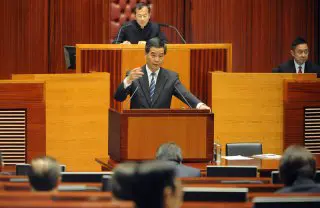Peace negotiators of the Myanmar government and ethnic armed groups successfully concluded negotiation of a draft nationwide cease-fire agreement (NCA) on Monday and the draft accord was preliminarily signed here Tuesday.
The signing between the government's Union Peace-Making Work Committee (UPWC) and ethnic armed groups' Nationwide Cease-fire Coordination Team (NCCT) was witnessed by President U Thein Sein as well as UN Special Envoy Vijay Nambiar's Secretary and Chinese Foreign Ministry Special Envoy for Asian Affairs Wang Yingfan.
U Thein Sein called the peace negotiators as builders of peace as the deal is desired by the people and will be remembered in the history, saying that the preliminary signing of the NCA is a significant step toward the formal signing of the agreement and will pave the way for political dialogue.
In the course of heading toward political dialogue, there may remain potential obstacles which are to be overcome through similar negotiations by the two sides, he said, adding the move was seen as the "Second Panlong Victory" which is historic and significant for national consolidation.
"Myanmar has seen an auspicious day with both high expectation and bright daybreak of peace," U Thein Sein said, urging all the participants to make more efforts for lasting peace in the future.
Minister of Information U Ye Htut also said successive governments in Myanmar tried to resolve internal conflict in their own ways, while President U Thein Sein attempted for cease-fire with more armed groups through alternative approach.
Minister at the President's Office U Aung Min, who leads the UPWC in the peace talks, said "The sooner the two sides sign the cease-fire accord, the sooner the people's wish for peace will be fulfilled."
U Naing Han Tha, who heads the NCCT, said there are likely to be few amendments to the tentative agreements achieved in the single text while seeking approval from their top ethnic leaders.
The United Nations Information Center here expressed welcome for the historic and significant signing of the draft NCA in Myanmar after more than a year of negotiation, describing the signing as a first step toward a larger dialogue for settling the political and military issues that will pave the way for an inclusive and harmonious future for Myanmar.
However, it is a crucial first stage that must be crossed before embarking on the next chapter, said a UN statement issued on Tuesday.
Myanmar is still in a nascent stage of its transition, the statement pointed out, saying that " Today's agreement is a signal that new levels of trust, confidence and cooperation are possible between former enemies and that the seeds of change in Myanmar are beginning to sprout".
The conclusion of the draft NCA was realized on the 7th day of the 7th round of peace talks.
Peace negotiators of the Myanmar government and ethnic armed groups issued a joint statement here Tuesday, saying that the finalized nationwide cease-fire agreement (NCA) preliminarily signed by the two sides is yet to be submitted to the top level of respective sides for adoption before it is formally signed.
According to the joint statement, the government's Union Peace- Making Work Committee (UPWC) is to forward the finalized NCA to the Union Peace-Making Central Committee, while the ethnic armed groups' Nationwide Cease-fire Coordination Team (NCCT) is to submit to the leaders of respective armed groups represented by an ethnic conference expected by April.
When the finalized NCA is approved, then venue, time and signatories are to be designated through coordination for the formal signing by leaders of the government and ethnic armed groups in Nay Pyi Taw.
After the formal signing by leaders of both sides, the NCA is set to be further forwarded to the parliament for approval and a framework for political dialogue is also to be drawn within one month, according to the draft NCA.
The two sides also issued a separate statement on stance of reducing conflict, holding that there occurred clashes in some places during the peace process under various backgrounds. "No matter which side suffered the loss, it was loss to the country," the statement maintained.
The statement pledged cooperation to ensure non-recurrence of attacks during the implementation of the peace process.
The peace process began in November 2013 when UPWC and NCCT met in Myitgyina, Kachin state's capital, for the very first time for the nationwide cease-fire talks, while the final round, which was the 7th, lasted in Yangon from March 17 to 30.
Ever since U Thein Sein's government took office in March 2011, it has vigorously pushed the process of national reconciliation, having realized cease-fire with over a dozen ethnic armed groups individually. It has now moved to a nationwide cease-fire and will then proceed to political dialogue for firm and eternal peace in the country.
 简体中文
简体中文

